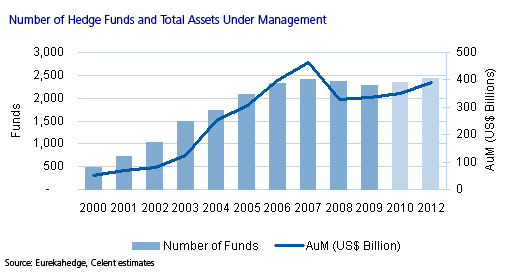Hedge Funds in Europe: Riders of the Storm
Abstract
Due to the economic downturn, the share of hedge funds with assets under management (AuM) over US$500 million has declined from 18% in 2008 to just 5% in 2009. Celent expects a recovery through 2010, and by 2012, the number of hedge funds to approach the 2007 peak. However, the average AuM for each fund is expected to be lower.
In order to cope with the downturn, hedge funds in Europe are becoming more efficient, using sophisticated risk management practices, increasing the number of trading relationships to reduce counterparty risk, and enhancing accountability to clients while becoming open to regulatory supervision. In a new report, Hedge Funds in Europe: Riders of the Storm, Celent analyzes the recent performance of hedge funds in Europe and discusses the future scenario expected for them.
The EU Directive on Alternative Investments is expected to lead to higher operational costs and create further pressure for an industry that has already suffered the brunt of the economic crisis. By one estimate, 83% of European hedge funds think that the new legislation would result in higher operational costs. It is seen as being too tough and putting firms based outside the EU that serve EU investors at a disadvantage. Similarly, non-EU firms that want to set up an office in Europe might be dissuaded from doing so. Among firms having an office in the EU, 10% would cease to do business because of the costs attached to the legislation.

“The European hedge fund industry is in a better position now than it was a year back, and in this scenario, the new EU directive might have an adverse effect on European business, thereby jeopardizing its recovery,” says Anshuman Jaswal, Senior Analyst and author of the report.
This report looks at hedge funds’ recent development, the impact of the credit crisis on their profitability and growth, regulatory developments such as the proposed European Directive on Alternative Investments and its expected impact on the industry, the ways and means in which the industry can get ready to cope with this new environment, its current degree of leverage and the possible impact across asset classes, and finally, the requirements for IT and how they differ according to the size and structure of the hedge funds.

